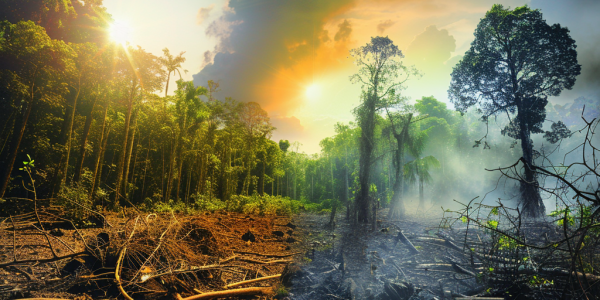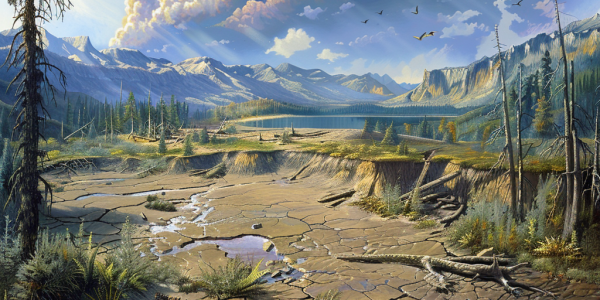Study Reveals Oceans’ Underestimated Role in Global Cooling
A groundbreaking study from the University of East Anglia reveals that oceans play a crucial role in global cooling, significantly underestimated in past climate models. Led by Dr. Charel Wohl, the research highlights how sulfur gases emitted by marine life, particularly methanethiol from plankton, enhance cloud brightness and reflect solar radiation, thereby regulating Earth’s temperatures. This pivotal finding calls for a reevaluation of climate models to better understand the ocean’s impact on climate dynamics and global warming mitigation.
Urgent Study Reveals Rising Costs and Risks of Climate Tipping Points
A new study reveals alarming financial and environmental implications of climate change, indicating that humanity may have crossed critical climate tipping points. Published in npj Climate and Atmospheric Science, the research highlights the urgent need for immediate action to mitigate escalating costs and irreversible changes, such as coastal flooding and biodiversity loss. As the overshoot window closes, policymakers are urged to recognize the gravity of the situation and prioritize climate strategies to address these pressing challenges.
Decline in Cloud Cover Linked to Record Global Temperatures
Recent research reveals that a significant decline in low-lying cloud cover in 2023 has contributed to record global temperatures, averaging 1.5°C above pre-industrial levels. This decrease in cloud cover has reduced Earth’s albedo, leading to increased solar energy absorption. As scientists investigate the complex interplay between cloud dynamics and climate change, understanding these factors is crucial for future climate models and mitigation strategies.
Study Links Ocean Density to Carbon Capture in Marine Plankton
Recent research from the University of Oxford reveals a critical link between ocean density and the carbon capture abilities of marine plankton, particularly foraminifera. This study highlights how changes in ocean density affect the calcification process of these organisms, with significant implications for carbon cycling and oceanic CO2 absorption in the face of climate change.
Privacy Choices and Hominin Dispersals: Insights from Recent Research
Explore the latest research on hominin dispersals in Eurasia, revealing how climate change and ecological shifts influenced early human evolution. This study highlights the intricate relationship between environmental factors and human migration patterns during the Mid-Pleistocene era, providing valuable insights into our species’ journey.
Dengue Fever Surge in Uttar Pradesh: A Public Health Crisis Linked to Climate Change
Uttar Pradesh faces a dengue fever crisis, with over 2,100 cases reported in 2024 alone. The surge, particularly in Lucknow, is linked to climate change, urbanization, and inadequate healthcare infrastructure. As hospitals struggle to cope, public awareness and government initiatives are essential to combat this vector-borne disease. Addressing these challenges requires a focus on sustainable urban development and climate action.
Navigating Privacy and Climate Challenges: Data Management and Marine Ecosystems
Explore the critical intersection of data privacy and climate change in our digital age. Learn how cookie management affects personal data and discover the profound implications of climate change on marine ecosystems, particularly the acclimatization of foraminifera. Stay informed and proactive in protecting your privacy and the health of our oceans.
Alarming Decline in Natural Carbon Sinks Poses Threat to Climate Efforts
Recent studies reveal that natural ecosystems, crucial for absorbing carbon dioxide, have nearly stopped this process, raising concerns about climate change. The decline in carbon sinks, exacerbated by rising temperatures and extreme weather, threatens to accelerate global warming. With 2023 marking the highest CO2 emissions ever, the need for urgent climate action is critical to preserve and restore these vital ecosystems.
Innovative CSAR Technology Enhances Carbon Capture Efficiency
Researchers from SINTEF have unveiled the Continuous Swing Adsorption Reactor (CSAR), a groundbreaking carbon capture and storage (CCS) technology aimed at efficiently sequestering post-combustion CO2. With less energy consumption than traditional methods, CSAR promises to enhance sustainability in combating climate change. Successfully trialed at a waste combustion plant in Norway, this innovative system is set to revolutionize the CCS landscape, offering a cost-effective solution for industries looking to reduce their carbon footprint.
Ancient Climate Shift Paved the Way for Dinosaurs’ Dominance
Recent research reveals how the Carnian Pluvial Episode, a significant climatic event 233 million years ago, triggered the rise of dinosaurs and reshaped Earth’s biodiversity. This study highlights the impact of volcanic eruptions on climate and draws parallels to modern climate change, emphasizing the importance of understanding our planet’s history for future ecological challenges.










